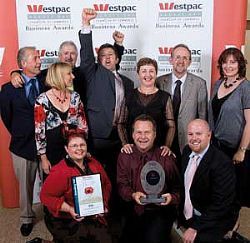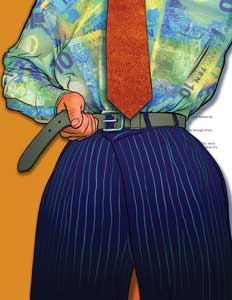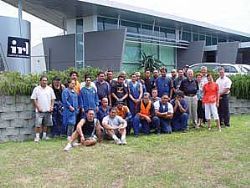LEADERSHIP IN TOUGH TIMES
Develop a leadership culture within your business and it will have a much better chance of getting through the economic downturn. Ian A Williams has more.
The current challenging economic climate is a great time to test the strength of your leadership in business. It really does sort out the capable and resilient from those who simply give up or hide in their shell. Where are you today? Are you in your shell or out there fighting for your future? Leadership is defined as a journey, a course that is set – and every journey has its challenges. While those who own, run and manage businesses are the ones who are called or appointed to be in a leadership position, everyone in a business has a leadership role to play, simply in leading themselves in doing their best in the team, and in enabling others to do their job well too. Just being efficient and effective in your own role means you are part of leading – if only leading by example! Recent UK research suggests that leadership has two distinct aspects: developing recognised leaders as individuals, and developing leadership as culture and practice in the whole organisation. So when the times get tough it’s a great opportunity for you as the owner to get all the help you can from those around you in leading your business to continuing success. When the pressure is on, your choice is to visualise and lead growth, or to survive and tread water. That choice will be very apparent to those around you. A downturn is the time for vision and growth in bringing all the creative skills of your team together to plan for the future. So let’s look at some key leadership characteristics as defined by John Adair. Sometimes these qualities don’t sound very businesslike, but they are really the heart of your business and your leadership if you want to achieve success: • Enthusiasm – passion and zest. • Integrity – the bedrock of good leadership. • Toughness and fairness – demanding, but no favourites. • Warmth – cold fish do not make good leaders. • Moral courage – to face and confront unpleasant situations. • Resilience – the ability to bounce back after setbacks. • Humility – lack of arrogance, being on the same level as others. How do you measure up? Ask those you trust. In his action-centred leadership model, John Adair defines leadership into three simple key elements which distinguish task, team and individual needs. Task needs Task relates to the purpose of your business. It’s not just about what you do, it’s about why you’re in business and what you want to achieve. A downturn may be a great time to review this, getting clear on what industry you’re in, what you want to provide for whom, and what results you’re aiming at. In getting this clear you will need to get ideas from people in your business about more efficient ways of working, new initiatives, and a renewed enthusiasm for what you do. After all, as the old saying goes, ‘if you do what you always do you’ll get what you always got’. Team needs Meeting the needs of people around you is essential to achieving what you need to achieve. It sounds obvious but this gets amazingly low priority in most businesses. Having the right mix of people with the right skills, having their roles clear, maintaining good communication, confidence, integrity and humour is invaluable. We are social beings and we need to work effectively with other people. Individual needs People need to feel valued, not only by you as the leader, but by the whole team. They need to feel that their time, energy, skills, talents and resources are being well used in the team and adding value to the task in hand. From you as the leader, this requires tact, fairness, compassion, consistency, honesty and humility. The three circle model of action-centred leadership is about keeping these three needs in balance, and of equal priority. Sometimes of course one of these aspects may require more of your time attention and energy, but the important thing is to keep them all maintained. The seven key leadership characteristics need to be role-modelled by you as the leader personally, and also be part of the leadership culture that permeates everyone in the organisation. That’s the kind of culture that will get you through any downturn, maintain productivity, encourage people to bring in their ideas and energy, and ensure that you have a really engaged workforce, enjoying what they do and the people they do it with. As the old Japanese proverb says, ‘No man will find the best way to do a thing unless he loves to do that thing.’ Ian A. Williams is a trainer, coach, author and speaker on leadership, and he represents John Adair in New Zealand. Visit www.kairology.com. John Adair is the author of action-centred leadership, and the world’s first professor of leadership. www.johnadair.co.uk. www.kairology.com





